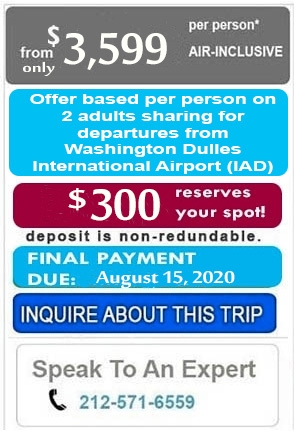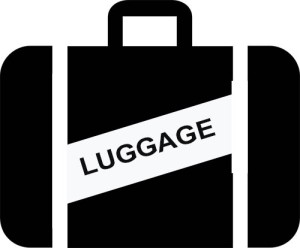[slide-anything id=”35296″]
3-Cities
Accra + Kumasi + Elmina
9 Days / 8 Nights
flight & hotel inclusive
November 14- November 22, 2020
=BOOK NOW=
This low-priced, “high value”
trip will SELL OUT!!!
=Limited Space Available=

“Join us on this exciting 3-city tour of the ‘Gold Coast’ country of Ghana. Believe me, you’ll never be the same after this extraordinary, in-depth, classic introduction to the rich culture, history and traditions of the Ghanaian people.
This trip is packed with great value, and YES, we always provide a flexible payment plan, and non-golfers you are always welcomed.”
Debert Cook, Publisher
African American Golfer’s Digest
[SINGLE SUPPLEMENT $325 = $4,150]
[LAND ONLY single occupancy rate $3,050]
[LAND ONLY double occupancy rate $2,499]
TOUR HIGHLIGHTS:
- Tour Independence Square, Nkrumah Memorial, National Theater, National Museum,
- Tour Historical Slave Dungeons (Castles)
- Tour the renowned Ashanti Museum
- Visit Cultural Sites, Kumasi Fort, the University of Ghana, Museum of Archaeology
- Visit the “Slave River” where captured Africans bathed before being confined in the Slave Castles to await shipment to the Americas and the Caribbean
- Enjoy optional tours, golf, spa & other activities
- Thrilling nightlife, bars, and fun at clubs
YOUR TOUR INCLUDES ALL THIS:
- Direct roundtrip flights Washington Dulles
International Airport (AID) to Ghana/Kotoka International Airport (ACC) - Accommodation as per the itinerary 6 nights;
- Group ground transport for the airport and select tours
- Meeting and assistance upon arrival & departure
- Most meals as per the itinerary; (6 breakfast, 6 dinners)
- Transportation in private vehicle
- All ground transfers as per the itinerary
- Experienced tour guide
- Comprehensive sightseeing as per itinerary
- Entrance fees to listed sites;
- Personalized Name Tag to boost your social networking throughout the trip
- The AAGD traveler luggage tag to help identify your bags
- The ‘Exclusively Chic’ AAGD Traveler T-Shirt!
Excluded
- Meals not listed in itinerary
- Any items of personal expense – i.e. drinks, telephone calls, laundry, etc.
- Gratuities for rangers/guides/drivers
- Visa on arrival
Round Trip Airfare to/from
Washington DC (IAD)
14Nov
South African Airways flight #210, departs 540PM from Washington Dulles International Airport (IAD)
15Nov Arrives into Ghana/Kotoka International Airport (ACC) at 835A
21Nov
South African Airways flight #209, departs Ghana/Kotoka International Airport (ACC) at 1120P
22Nov Arrives into Washington Dulles International Airport (IAD) at 600A
*ITINERARY
Saturday, Nov. 14 – Day1:
Overnight Travel
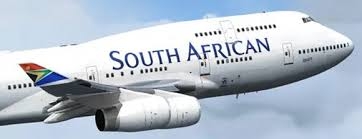
South African Airways,
Africa’s Most Awarded Airline



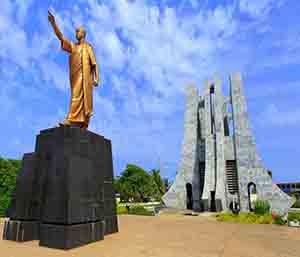

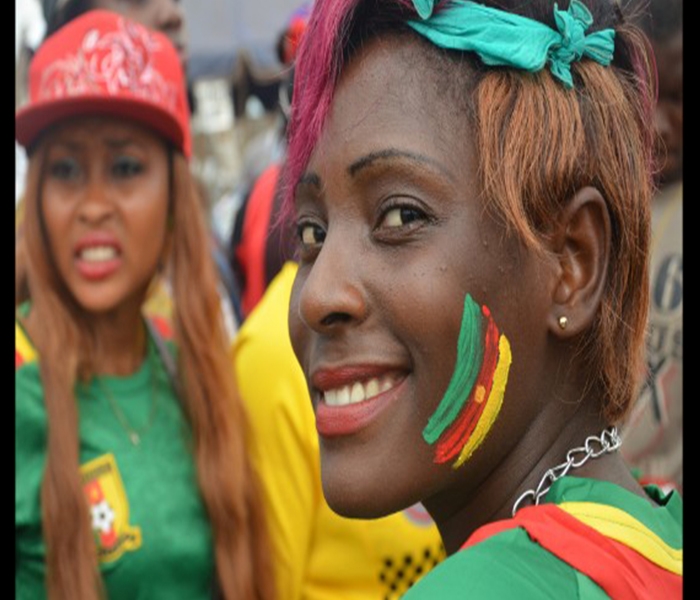
Depart from Washington Dulles on your South African Airways flight.
Sunday, Nov. 15 – Day2:
Labadi Beach Hotel, Accra
Immerse yourself in the local culture, learn a few native words during your visit. The word ‘vim’ is Ghanaian slang for ‘energy and industriousness’ and you’ll immediately notice the lively atmosphere that overwhelmingly permeates the nation’s bustling capital, Accra. The city is massive and full of eye-popping sights. There is an intriguing mixture combination of city and village life. You will drive past affluent neighborhoods and see how they complete with upmarket restaurants, glitzy shopping malls, and western fast-food chains that are interspersed with lower economic areas, characterized by the bustling street culture that engulfs much of Ghana. Somehow, residents manage to bring it all together in love, peace, and harmony, in a vibrant atmosphere. You’ll witness insights into Ghana’s fascinating history and culture from prehistory to the present.
Overnight: Labadi Beach Hotel
Set amid tropical landscaped gardens, adjacent to one of Ghana’s most popular beaches in the country’s administrative, communications and economic center, Labadi Beach Hotel caters for both the business and leisure traveler. The hotel boasts 162 rooms and suites, all of which have individually controlled airconditioning, color TV with 15 satellite channels, mini-bar, direct-dial telephones, luxury private bathrooms and a large balcony that offers panoramic views. The hotel’s Akwaaba Restaurant serves a full English breakfast as well as an extensive buffet for both lunch and dinner. Widely regarded as the best buffet restaurant in Accra, items are changed on a daily basis and include Ghanaian as well as continental specialties.
Monday, Nov. 16 – Day3:
Labadi Beach Hotel, Accra
After breakfast you will depart on a Full Day tour of Accra.
Visit the W.E.B. Du BoisCenterhonoring the life of one of the most prominent Pan-Africanists who chose to live and work in Ghana. Independence Square, Accra’s open-air ceremonial grounds where all national celebrations are held. Continue to the Kwame Nkrumah Mausoleum and museum, a tribute to Ghana’s first President. This park, formally called the Polo grounds, is where Dr. Kwame Nkrumah declared the independence of Ghana.
Overnight on a dinner, bed and breakfast basis at Labadil Beach Hotel or similar
Tuesday, Nov. 17– Day4:
Golden Tulip Kumasi Hotel, Kumasi
Renowned for its cultural heritage the city of Kumasi serves as an important Ashanti cultural center of the Ashanti Region in Ghana. The ancient capital of the Ashanti Kingdom features a fascinating blend of modern and historical treasures. Visitors can look forward to exploring many interesting sites and enjoy a host of wonderful activities including browsing the fascinating open-air Kejetia Market, offering locally made goods; visiting the Jubilee Museum, which displays ceremonial garments and jewelry of the 20th-century Ashanti King; and learning more about Ashanti traditions at the popular National Cultural Centre.
Day Itinerary
After breakfast you will depart the hotel and head to Kumasi, the capital of the Ashanti Kingdom.
Visit the Manhiya Palace, built to receive The Asantehene (ruler of the Ashanti people) Prempeh; it now serves as a museum, containing a range of items relating to the Ashanti Kingdom, particularly Prempeh I (ruled 1888-1931) and Prempeh II (ruled 1931-1970). Visit the nearby OkomfoAnokye Sword, an important symbol of Ashanti unity that marks the spot where the Golden Stool “descended from the sky” and has been in place for 300 years. Legend says the Ashanti Kingdom would collapse should the sword ever be removed.
Overnight on a dinner, bed and breakfast basis at Golden Tulip Kumasi or similar
Overnight: Golden Tulip Kumasi Hotel
The Golden Tulip Kumasi City Hotel has a lush setting of surrounding tropical gardens and a reputation for being a top hotel in Kumasi. From tennis courts in its beautiful tropical gardens to a stunning and well equipped executive floor, all the hotel rooms have amenities expected from a 4-star accommodation. The decor is stylish with many added local touches to make a vacation in Ghana special,
All hotel rooms are comfortably furnished. The modern décor combined with local flair brings charm to each one of the 160 rooms.
The Golden Tulip Kumasi City also has many delights for guests to sample outside of the 4-star hotel room. Enjoy an active day in the beautiful Kumasi sunshine by going for a swim in the pool or playing a round of golf or a game or two of tennis. After a day or activity escape from the tropical heat to the lobby bar and enjoy something from the hotel’s delicious cocktail menu or celebrate special occasions at the Drive VIP bar.
The Golden Tulip Kumasi is just a 30-minute drive from Kumasi International Airport and is easily accessible from the city center. The hotel is also directly next to the prestigious Royal Golf Course.
Wednesday, Nov. 18– Day5:
Golden Tulip Kumasi Hotel, Kumasi
Day Itinerary
After breakfast you will depart and visit the Ashanti craft villages:
The woodcarving village of Ahwiaa, known for the talented craftsmen who fashion royal stools, walking sticks and fertility dolls from wood. You will have the opportunity to purchase hand-carved items of all kinds.
The Village of Ntonso where artisan’s hand-stamp patterns on cotton cloth to make Adinkra textiles. Black-on-black and black-on-red Adinkra cloth is worn for funerals and other solemn occasions. You will learn how the black dye is made in the village from the bark of trees, and create your own Adinkra sash to take home. You may also purchase large pieces of Adinkra cloth handmade in the village.
The village is Bonwire, where the famous Kente cloth is handmade on looms in a time-honored tradition passed down through generations. You will see the Kente weavers in the process of creating Kente cloth in various styles, and have the opportunity to purchase souvenirs or gifts.
This evening visit the Kumasi Central Market (also known as Kejetia Market), the largest open-air market in West Africa, where more than 10,000 vendors sell their wares. Here you will find just about everything, food, fabric, beauty products, handmade shoes, purses, wallets, arts & crafts.
Overnight on a dinner, bed and breakfast basis at Golden Tulip Kumasi or similar
Thursday, Nov. 19– Day6:
Coconut Grove Beach Resort, Elmina
Located along the south coast of Ghana, the fishing port of Elmina is best-known for its beautiful beaches and serves as the capital of the region. It is also known as a historical slave-trading port and offers visitors a glimpse into the tragic history of the slave trade. Visitors can learn more about the area’s past by visiting a number of fascinating sites including: the 17th-century Fort St. Jago, the Elmina Java Museum, the Dutch Cemetery and Elmina Dungeon (Castle), built by the Portuguese in 1482, it is the oldest European building in existence south of the Sahara.
Day Itinerary
After breakfast you will depart and head to the Cape Coast.
Stop at the Gold mine town of Obuasi and AssinManso, the burial site of two former slaves from the U.S. and Jamaica. Visit the “Slave River” where captured Africans bathed before being confined in the Slave Castles to await shipment to the Americas and the Caribbean.
This evening go on a guided tour through the ancient town of Elmina.
At the harbor, view the colorful fishing canoes getting ready to go to sea for another night’s task of fishing. This is a picture-perfect opportunity for photographers.
Overnight on a dinner, bed and breakfast basis at Coconut Beach Resort or similar
Overnight:
Coconut Grove Beach Resort is set on the oceanfront in Elmina. The resort’s guest rooms are equipped with Wi-Fi, TV, air-conditioning, ceiling fan, telephone, and a refrigerator. For guest’s enjoyment, there is an outdoor swimming pool, clay tennis courts, basketball court, gym, and an 18 hole golf course. For daily activities, guests can explore the resort’s mini animal sanctuary or spend the day at the beach and horseback riding.
Friday, Nov. 20– Day7:
Coconut Grove Beach Resort, Elmina
Day Itinerary
After breakfast you will depart and visit Elmina Castle, a UNESCO World Heritage Site built in 1482.
This castle was the first European structure built in sub-Saharan Africa. In the afternoon visit Cape Coast Castle and the Castle Museum for a guided tour. Cape Coast Castle is a UNESCO World Heritage Site, and was one of the departure points for Africans being sent into slavery in the Americas. The castle is home to the “Door of No Return”.
Saturday, Nov. 21– Day8:
Overnight Travel
Day Itinerary
Today you will be transferred to the airport for your flights to the US.
Sunday, November 22 – Day 9:
End of Itinerary
Arrival in the United States at Washington Dulles airport.
| Accommodation | Destination | Start | End | Includes | Duration |
| Overnight Travel | 14-Nov | 15-Nov | 1 Night | ||
| Labadi Beach Hotel | Accra | 15-Nov | 17-Nov | Dinner & Breakfast | 2 Nights |
| Golden Tulip Kumasi Hotel | Kumasi | 17-Nov | 19-Nov | Dinner & Breakfast | 2 Nights |
| Coconut Grove Beach Resort | Elmina | 19-Nov | 21-Nov | Dinner & Breakfast | 2 Nights |
| Overnight Travel | 21-Nov | 22-Nov | 1 Night |
| Transfers | ||
| Date | Pick Up | Drop Off |
| 15-Nov | Kotoka International Airport [ACC] | Labadi Beach Hotel |
| 17-Nov | Labadi Beach Hotel | Golden Tulip Kumasi Hotel |
| 19-Nov | Golden Tulip Kumasi Hotel | Coconut Grove Beach Resort |
| 21-Nov | Coconut Grove Beach Resort | Kotoka International Airport [ACC] |
**Important Notice: Your passport must have four blank visa pages (two facing pages – two facing pages) for any visas and entry stamps upon arrival in Ghana. (Please make sure the blank pages say “Visa” at the top) If visiting other countries, more will be required. Also, your passport must be valid for six months after the intended date of return from Ghana.** Only MACHINE READABLE TRAVEL DOCUMENTS (MRTDs) will be accepted to enter Ghana with effect from 24 November 2015. Please note that extended passports won’t be accepted any longer. For this reason we advise you to closely check your travel documents.
 *Itinerary subject to change and prices subject to change without reservation.
*Itinerary subject to change and prices subject to change without reservation.
Travel Information
Ghana is often referred to as ‘Africa for beginners’ and for good reason. It is a friendly and largely safe country with locals who typically speak excellent English and are usually eager to help first-time foreigners find their feet on African soil. This spectacularly scenic nation boasts an exquisite tropical coastline and some exceptional national parks providing a haven for some unusual flora and fauna. The capital, Accra is a thriving metropolis complete with bustling markets, luxury hotels and a lively nightlife scene. Pack your itinerary with visits to gorgeous palm-fringed beaches, ancient forts, historic dungeons/castles, and quaint fishing villages. Whether you are seeking a relaxing beach vacation or are keen to immerse yourself in the fascinating ancient cultures of this nation’s diverse ethnic groups, Ghana offers a unique and compelling African experience.
As a general precaution, all travelers are advised to carry a photocopy of the photo/bio information page of their passport and keep it in a location separate from their passport. Also recommended is that you take a picture of your passport with your phone to keep it handy.
CUSTOMS, Duty & Restrictions
See customs restrictions and more information on importing items here: https://kingshakaairport.info/travel/airport-customs.html
TRAVEL TIPS:
- Keep a photograph of your luggage and passport on your smartphone
- Download the GateGuru app before your next trip: It shows maps and amenities for any terminal
- By far the best transit guide is CityMapper. It’s free, and offers real-time directions via public transport, on foot, or by car
Safety Notices
For international travel advisory and emergency, alerts check the U.S. Department of State website. If you have lost your passport or wallet, please contact the local police department and file a report. Once you have done this, contact the U.S. Embassy in Ghana
U.S. Embassy Ghana
No. 24, Fourth Circular Rd., Cantonments, Accra
P.O. Box GP 2288
Accra, Ghana
Phone: +233 (0) 30 274 1000
Travel and Medical Insurance
Comprehensive medical insurance is advised. Travel insurance is highly recommended and can be purchased through SAA Vacations or your travel agent. It can be used to cover baggage and personal item loss as well as trip cancellations. SAA Vacations will not be held responsible for any loss or damage to a passenger’s belongings. Travel Guard is the (travel) insurance carrier offered through SAA Vacations.
Travel Vaccines & Advice for Ghana
Yes, some vaccines are recommended or required for Ghana. Countries may change their vaccination requirements without notice and in some instances, border agents use their discretion to deny entry despite the officially stated requirements. Visit these websites to see the Centers For Disease Control and Prevention (CDC) and World Health Organization (WHO) recommendations.
Yellow Fever Requirement
A Yellow Fever vaccination certificate is required on arrival in Ghana from all travelers 9 months of age and older. The vaccination requirement is imposed by this country for protection against Yellow Fever since the principal mosquito vector Aedes aegypti is present in its territory.
A Yellow Fever certificate is valid 10 days after vaccination.
LUGGAGE Information
- Checked: 2 pieces at 50 pounds each per person.
- Carry on: 2 pieces -18 pounds total, one to fit in the overhead and one under the seat in front of you.
- Golf Bags are free of charge as long as the weight is under 51 pounds and with a maximum length/width/height dimension of 200cm (78.8″). The Golf bag counts as 1 piece of your 2 pieces checked luggage limit.
The amount of hand and checked baggage you are allowed depends on the class that you are flying. Your travel package has been booked for COACH class unless you have notified our agent that you wish to pay for an upgrade to Business or First Class. See all of the baggage allotment and restrictions HERE.
TRAVEL TIPS:
- Keep a photograph of your luggage and passport on your smartphone
- Download the GateGuru app before your next trip: It shows maps and amenities for any terminal
- By far the best transit guide is CityMapper. It’s free, and offers real-time directions via public transport, on foot, or by car
Banking and Currency
Currency
Ghana Cedi (GHS; symbol ¢) = 100 Ghana pesewas. Notes are in denominations of ¢50, 20, 10, 5 and 1. Coins are in denominations of ¢1 and 50, 20, 10, 5 and 1 pesewas.
The import of local currency is limited to the amount previously taken out of the country and declared. The import of foreign currency is unlimited, but must be declared upon arrival. The export of local currency is limited to ¢1,000. The export of foreign currency is limited to US$5,000 or equivalent. None of this is likely to have any practical implications for tourists.
The exchange rate system has been liberalized and foreign currency is freely available through authorized dealers including banks and foreign exchange bureaus. The US dollar is the most widely recognized currency, and smaller bills often fetch a poor rate compared with US$50 or US$100 bills.

US Dollar to Ghanian Cedi Currency Converter
Banking
Banking hours: Monday-Friday 08h30-16h00; some banks also open Sat 08h00-12h00.
Credit and debit cards are accepted by some leading hotels, restaurants, banks, businesses and upmarket shops in Accra, but are seldom accepted elsewhere in the country, and fraud is quite common. In large urban areas such as Accra and Kumasi, a safer bet is to draw local currency from one of the many ATMs that accept international credit cards. By far the most widely accepted type of card is Visa. MasterCard is also accepted at some outlets, but other brands, including American Express and Diners Club, are near useless in Ghana.
In large urban areas such as Accra and Kumasi, ATMs accepting international Visa cards (and occasionally MasterCard) are common.
Travelers checks are close to useless in Ghana. One of the few places that will exchange them is the head office of Barclays Bank in Accra and Takoradi, but it seems likely this facility will eventually close too.
Immunizations: Look at Travel.State.Gov for complete details on Passport/Visa and Vaccinations.
Get travel and safety updates while abroad by enrolling in the Smart Traveler Enrollment Program (STEP).
Communicating While Abroad Through WhatsAPP
DOWNLOAD WhatsApp before you leave the USA for easy WiFi use in communicating with the tour group, friends and family back home during your international travel. This application is available for Android and IOS.
Travel, Transport and Getting Around
UBER is a travel option in Ghana. See rates HERE
The speed limit is 50kph (31mph) in towns and 80kph (50mph) outside of towns. Seat belts are compulsory and drunk driving is illegal. A UK driving license is theoretically valid for 90 days, but you are less likely to be queried by bribe-seeking officials if you carry an International Driving Permit.
Taxis are available throughout Ghana.
Accra has extensive bus and taxi services operated by the private sector. There is an abundance of taxis in the towns. Prices are reasonable. Drivers do not generally expect tips. Other ways of getting around, for the more adventurous traveler, are tro-tros (mini-buses), which are usually far less comfortable than taxis.
Food, Drink and Cuisine Advice
Water sources should generally be regarded as being potentially contaminated, and water used for drinking, brushing teeth or making ice should have first been boiled or otherwise sterilized. Inexpensive sachets and bottles of purified water are readily available throughout the country. Milk is unpasteurized and should be boiled. Powdered or tinned milk is available and is advised. Avoid dairy products that are likely to have been made from unboiled milk. Only eat well-cooked meat and fish. Vegetables should be cooked and fruit peeled.
International food is available in most large hotels and many restaurants serve a range of local traditional foods. In Accra, there are also restaurants serving Middle Eastern, Indian, Southeast Asian, French and pretty much every other international cuisine you can think of. The country’s largest concentration of eateries lies along and around the main drag through Osu – known locally as Oxford Street – where you could literally eat somewhere different every night for a month. Fast food outlets are also well represented in upmarket areas such as Osu and the Accra Mall.
Outside of Accra, a fair selection of cuisines is represented in the likes of Kumasi, Takoradi, Tema, Cape Coast, and Elmina. The most popular international cuisine is Chinese, which seems to find its way onto even the most unimaginative hotel restaurant menus.
Alternatively, wherever you are in Ghana, local food can be eaten in small restaurants known as ‘chop bars’, where you will generally be served with rice or a local staple together with a portion of meat or vegetable stew. Almost as ubiquitous (except in a few small and very Islamic settlements in the north) are small local bars known endearingly as ‘spots’. These usually serve inexpensive chilled lager-style beers in 750ml bottles (brands include Guder, Bell and Club, all with an alcohol level of around 5%) as well as inexpensive draught beer (called bubra) in the south.
Tipping is permitted; it is not usually included in the bill.
Climate and Weather
The best time to visit Ghana is between November – March when there is little to no rainfall, and every part of the country is easily accessible.
Ghana has a typically tropical climate thanks to its proximity to the equator and low elevations – the entire country lies below 1,000m (3300ft). Daytime temperatures are high throughout the year, approaching or surpassing 30°C (86°F) on most days, and humidity is also very high, especially along the coast. Temperatures tend to drop to around 20°C (68°F) drop at night, more noticeably in the relatively dry north than the humid south. The most temperate part of Ghana is the highlands area flanking the Volta Basin, which is often pleasantly cool after dusk.
There are two rainy seasons: from March to July and from September to October. Rainfall is highest in the south, with some areas receiving in excess of 2,000mm each year, but the drier north more typically receives about 800mm annually. The capital Accra, together with the coast running east to Togo and Benin, lies within the Dahomey Gap, a tract of savannah that receives relatively little rain and divides the Upper Guinean forests (running westward from central Ghana) from the Lower Guinean forests (running southward from Nigeria southward to the Congo). A noteworthy climatic phenomenon is the Harmattan winds, which blow in from the northeast from December to March, bringing dust from the Sahara and reducing visibility to as little as 1km (0.6 miles).
Clothing and Dress Recommendations What To Pack
Clothing and Dress Recommendations
Light and loose is the way to go in this humid tropical climate. Bring light trousers or skirts made of a natural fabric such as cotton, combined with a stash of cotton T-shirts, and plenty of socks and underwear, also ideally must be made from natural fabrics to prevent fungal infections. Ghanaians are relatively relaxed about dress codes, but women should keep their shoulders covered and wear a skirt below the knees in the predominantly Muslim north. One sweater or sweatshirt should be adequate, since night time temperatures are seldom chilly. As for footwear, a good pair of walking shoes with solid ankle support is a must, but you’ll also want sandals. If you forget anything, don’t stress: there is a massive used-clothing industry in Ghana, and having new clothes made from local fabrics is quick and affordable.
Electricity and Plug Standards
For the most part, there are two types of electrical sockets (outlets) used in Ghana: the “Type G ” British BS-1363 and the “Type D” Indian (old British BS-546 5 amp “small”) sockets. If your appliance’s plug doesn’t match the shape of these sockets, you will need a travel plug adapter in order to plug in. Travel plug adapters simply change the shape of your appliance’s plug to match whatever type of socket you need to plug into. If it’s crucial to be able to plug in no matter what, bring an adapter for both types.
Electrical sockets (outlets) in Ghana usually supply electricity at between 220 and 240 volts AC. If you’re plugging in an appliance that was built for 220-240 volt electrical input, or an appliance that is compatible with multiple voltages, then an adapter is all you need. If your appliance is not compatible with 220-240 electrical output, a voltage converter will be necessary.
SMILE!
By participating in our programs and events you are consenting to be photographed/videotaped for material to be used in our publication and marketing efforts.


